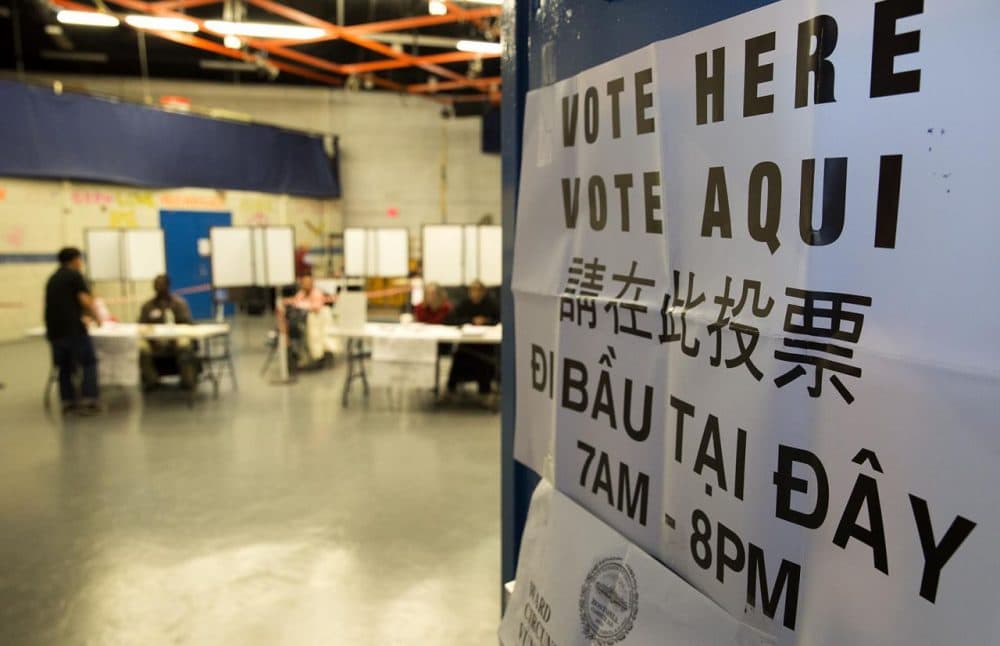Advertisement
Election Day: Handicapping Boston Council, Brockton Senate Races

Polls are open in dozens of communities across Massachusetts.
While turnout projections are low, voters in Boston are selecting members for the City Council and a competitive race is expected in one state Senate district south of Boston. Here's a look at those two elections.
Projections for turnout in Boston range from a few to not very many. Turnout in the September preliminary elections in Districts 4 and 7 set a new low among recent city elections on record. (No other district had enough challengers to warrant a first round.) The Boston Elections Department releases vote counts throughout Election Day, so we’ll have a good sense early on whether we’re on track for another record low. (Note: We'll provide updates throughout Election Day on Boston turnout here.)
Key Boston races to watch:
Voters might be forgiven for not turning out in waves, given that the Boston City Council has not exactly covered itself in glory this year. The most newsworthy thing the council has taken up this year was giving itself a pay raise. That raise would have happened automatically even if the council didn’t vote for it, which it did last week, a scant six days before the election.
District 4: District 4 Councilor Charles Yancey voted no on the pay raise, but that may be too little and too late to save him. Yancey suffered a 24-point defeat at the hands of newcomer Andrea Campbell in the September preliminary election. An analysis of that contest by MPG’s Maya Jonas-Silver suggests Yancey faces an very steep climb to change the outcome. The districts where Campbell did well have historically seen a larger increase in turnout between the preliminary phase and the final vote. If anything, prior turnout suggests Campbell could win even by an even larger margin on Tuesday.
At-large city council: In a true game of political musical chairs, five candidates are vying for four seats for at-large city council.
Advertisement
To get onto the council, challenger Anissa Essaibi-George, who has been endorsed by Attorney General Maura Healey, must out-poll one of the four incumbents.
Her two most likely targets appear to be Stephen Murphy and Michael Flaherty, though no polling data on the race is available. Murphy perhaps came off the worst of the councilors in a recent Globe expose on councilors' work habits; records show he used his campaign account to pay for meals near his Florida condo last winter, while constituents were contending with record snowfall.
Murphy’s saving grace may be the aforementioned anemic turnout, which conventional wisdom holds favors incumbents. On the other hand, the last two times an outsider knocked off a sitting at-large councilor were non-mayoral, low-turnout years. In 1999, when Flaherty unseated Albert “Dapper” O’Neil, only a quarter of voters cast a ballot. In 2007, when John Connolly bested Felix Arroyo Sr., a pitiful 14 percent voted.
South of Boston:
State Senate: For political observers beyond Boston, the most interesting race in Massachusetts is unfolding 25 miles due south of Boston, in the Second Plymouth and Bristol State Senate District. Two state representatives, Democrat Michael Brady of Brockton and Republican Geoff Diehl of Whitman, are vying to fill the seat of the late Democratic Sen. Thomas Kennedy, who died in June.
Last year, MPG ranked the state Senate districts in terms of their competitiveness. Second Plymouth and Bristol fell in the middle of the pack. Democrats have a 28-point enrollment advantage in the district, 14th best among the 40 districts. But in recent statewide elections Democratic candidates only won the district by 7 points, the 21st biggest margin among districts. Second Plymouth and Bristol also voted more for Diehl’s gas tax repeal question and for Gov. Charlie Baker in 2014 than the statewide averages -- but only slightly. There is not enough data to suggest which way this race will likely tilt.
The race has become a bit of a proxy war between the two state parties. Diehl has attracted a following among conservatives for spearheading last year’s successful ballot measure to repeal the indexing of the state’s gas tax to inflation. He also mobilized the same group to oppose Boston’s bid for the Olympics from the right. Conservative outside groups like the Massachusetts Fiscal Alliance and Job First are campaigning for him. Baker attended a fundraiser for him last month, and he has out-raised Brady by a two-to-one margin.
If Diehl is a rising star in conservative circles, he has also made him a target for progressives. Labor unions have lined up behind his opponent Brady, and the Environmental League of Massachusetts, which opposed repealing the gas tax indexing, is targeting Diehl as the first of its “dirty dozen” legislators with poor records on environmental issues. Brady could also benefit from a municipal election boosting turnout in his home city of Brockton on Election Day. The district is split into two parts, with each party carving out its own area. There no similar municipal elections in Diehl’s strongholds in the district that day.
The data suggests the district could be ripe for a pick up by the GOP. The question is whether Diehl’s high profile will attract conservative-leaning voters more than it energizes Democrats looking to knock him down a peg.
Steve Koczela is president of the MassINC Polling Group and a regular contributor to WBUR Politicker. Follow him on Twitter @skoczela. Rich Parr is research director of the MassINC Polling Group.